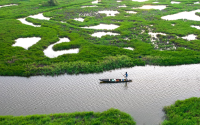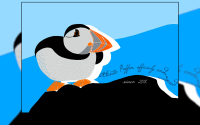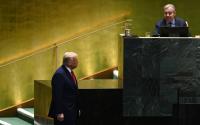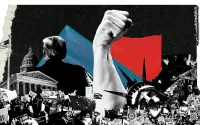18 October 2005
Well, of course, the investigation of who leaked CIA agent Valerie Plame's name -- violating the federal law that bars the "outing" of intelligence operatives -- has come around to Vice President Dick Cheney's office. While it may be news to the Washington Post -- which headlined a breathless report on Tuesday: "Cheney's Office Is A Focus in Leak Case" -- the fact is that Cheney and his aides have been likely suspects from day one.
No prominent member of the administration had more to lose as a result of the 2003 revelation by Plame's husband, former Ambassador Joe Wilson, that the White House's pre-war claims regarding Iraq's weapons of mass destruction had been inflated than did Cheney -- who, to a far greater extent than George Bush, had a hand in shaping the arguments for going to war, plugged them in media appearances and defended them after all evidence suggested his pronouncements had been wrong. It is important to recall that, while Bush may have deliberately fuzzed the facts in his 2003 State of the Union address, it was Cheney who leapt off the cliff of speculation with the pre-war declaration that, "We know Saddam Hussein's been absolutely devoted to trying to acquire nuclear weapons, and we believe he has, in fact, reconstituted nuclear weapons."
No key player in the administration was more at odds with the Central Intelligence Agency than Cheney. Indeed, Cheney's badgering of the agency to come up with "evidence" of Iraqi WMDs and al-Qaeda connections was so aggressive -- he regularly stormed into the CIA headquarters to demand a briefing and then, when the information did not fit his biases, demanded that someone else brief him -- that members of the House Intelligence Committee complained in a reprimanding letter, "These visits are unprecedented. Normally, vice presidents, including yourself, receive regular briefings from (the) CIA in your office and have a CIA officer on permanent detail. There is no reason to make personal visits to the CIA."
No top office within the administration was better positioned than Cheney's to gather the information that was used to attack Wilson and his wife and to peddle that information to the press. In fact, as Joe Wilson told me in an interview about the leaking of his wife's name that we did early in 2004, "With respect to who actually leaked the information, there are really only a few people -- far fewer than the president let on when he said there are a lot of senior administration officials -- who could have done it. At the end of the day, you have to have the means, the keys to the conversations at which somebody might drop my wife's name -- deliberately or not -- a national security clearance, and a reason to be talking about this. When you look at all that, there are really very few people who exist at that nexis between national security and foreign policy and politics. You can count them, literally, on two hands."
Wilson added that, without a doubt, "the vice president is one of those people."
And no one, repeat no one, in Washington is known to be more vindictive than Dick Cheney. So the notion that Cheney would not only have been aware of but in fact delighted in punishing Wilson by ruining the career of the ambassador's wife is entirely plausible. By all accounts, special prosecutor Patrick Fitzgerald is investigating that prospect as his long examination of crimes that may have been committed in relation to the Plame leak draws to a close.
Does this mean that the vice president will be indicted by the federal grand jury that is currently examining the actions of White House political czar Karl Rove and, more importantly, Cheney Chief of Staff I. Lewis "Scooter" Libby?
Don't bet on it.
Libby is blood-oath, fall-on-the-sword loyal to Cheney. A Reagan-era State Department hand and Congressional staffer who came to know his future boss when Cheney was serving in Congress during the 1980s, Libby went with Cheney to George H. W. Bush's Defense Department -- serving Secretary of Defense Cheney as Principal Deputy Under Secretary for Strategy and Resources and Deputy Under Secretary for Policy. Libby was then a founder of the neo-conservative Project for a New American Century, which promoted the vision of American Empire that Cheney and his staff had cooked up in their controversial draft Defense Policy Guidance statement during their final days at the Pentagon. And when Cheney returned to the corridors of power, as vice president, Libby was at his side.
But the Cheney-Libby partnership is not merely a power and policy connection. Their relationship is more father-son than boss-surrogate. Libby vacations with Cheney at the vice president's $2.9 million villa in Wyoming, and Libby's access is such that he is welcome to invite friends and compatriots along to enjoy the skiing near Jackson Hole.
The likelihood that Libby would give up a relationship that has buttered his bread for the better part of a quarter century is even more remote than the likelihood that Rove would turn on Bush.
Yet, no one who knows about how Cheney and Libby operate will doubt that the two men had no secrets from one another during the period when the attacks on the CIA, in general, and Wilson and Plame, in particular, were taking place.
The vice president is a famously hands-on player. He personally requested information about claims that the Iraqis were attempting to obtain uranium from African countries -- the issue that Wilson examined in 2002, when he was dispatched to Africa and found that the claims were not credible. And while Cheney now says that he knew nothing of the report that Wilson produced before the war, the former ambassador has never believed him.
"If you are senior enough to ask the question, you are senior enough to get a very specific response," said Wilson. "In addition to the circular report that was sent around as a consequence of my trip, I have every confidence that one way or another the vice president was briefed as well." Yet, it was the vice president who continued to claim, long after Bush had dropped the line, that Saddam Hussein was a nuclear threat. And Cheney always went much further than Bush or others in the administration when making that claim. Indeed, it was Cheney who specifically stated prior to the Congressional votes on authorizing the use of force in Iraq that, Hussein had "resumed his efforts to acquire nuclear weapons." Cheney claimed in the same speech that, "Armed with an arsenal of these weapons of terror, and seated atop 10 percent of the world's oil reserves, Saddam Hussein could then be expected to seek domination of the entire Middle East, take control of the world's energy supplies, directly threaten American friends throughout the region, and subject the United States or any other nation to nuclear blackmail."
It is certainly reasonable to argue that Cheney had more reason to strike out at Wilson than anyone else in the administration when the former ambassador revealed the truth in a New York Times opinion piece that appeared in the summer of 2003. And, while Cheney may not have done the deed directly, it is comic to suggest that the vice president -- who was in constant contact with both Libby and Rove around the time of the leak -- could have been unaware of any serious effort to discredit Wilson by "outing" his wife as a CIA agent.
John Nichols' biography of Vice President Cheney, Dick: The Man Who Is President (The New Press, 2004) is currently available nationwide at independent bookstores and at www.amazon.com. An expanded paperback version of the book, which Publisher's Weekly describes as "a Fahrenheit 9/11 for Cheney" and Esquire magazine says "reveals the inner Cheney," will be available this fall under the title, The Rise and Rise of Richard B. Cheney: Unlocking the Mysteries of the Most Powerful Vice President in American History (The New Press).






